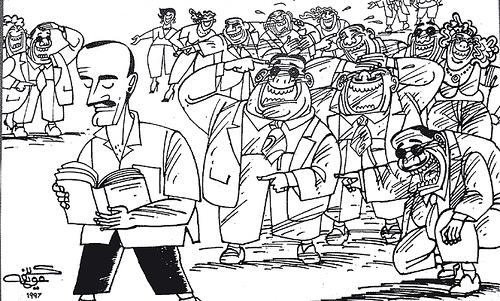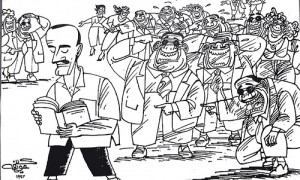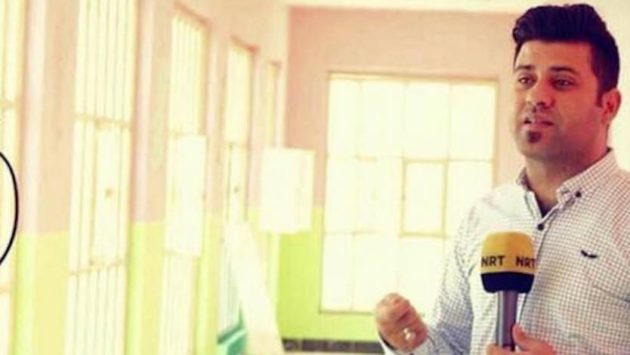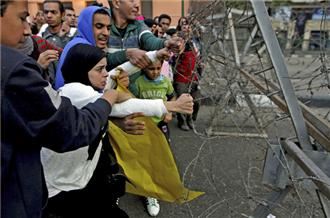The Iraqi Civil Society Solidarity Initiative (ICSSI) urges you to support a lawsuit before the Iraqi Federal Court to abolish the so-called “Journalists’ Rights Law” recently passed by the Iraqi parliament. This law explicitly violates articles 13, 14, 38 and 46 of the Iraqi Constitution, which protect freedom of the press and freedom of expression.
This law is incompatible with Iraq’s international obligations to the Universal Declaration of Human Rights, and under the International Covenant on Civil and Political Rights and both signed by the Iraqi State. It also compromises the constitutionally guaranteed principle of equal citizenship, by conferring illegal and illegitimate benefits and privileges on journalists. Moreover it describes the role of the journalist as working to promote the acts of government authorities, thereby totally undermining public confidence in the media.
Among the main problems of this law, there is a requirement for all media organization to be “registered according to law” while there exist no transparent registration process, which leads to fear that independent media will be considered illegal. This proposed law also breathes new legitimacy into old dictatorship-era censorship laws which have not yet been formally abolished, especially the infamous “publishing crimes law” which condemns journalists with very severe measures for undefined crimes related to publishing false or unprovable information: besides being forced to pay disproportionate fines, their newspapers can be closed temporarily and their license can be withdrawn.
A lawsuit to repeal the “Journalists’ Rights Law” has been organized by the Society for Defending Press Freedom (SDPF), an Iraqi Non-governmental Organisation, and is supported by many Iraqi journalists and media activists. It was rejected by the Court on 30th January2012 under pretenses related to the lack of a new registration for the SDPF, a long-established and reputable Iraqi organisation. This is, in itself, a serious problem but the immediate concern is the “Journalists’ Rights Law”.
Mr. Uday Hatim, head of the Society for Defending Press Freedom, is bravely filing again the lawsuit in April 2012, this time in his personal capacity as an Iraqi citizen. Mr Hatim and his colleagues of the SDPF are very concerned about the consequences of this law for Iraqi freedom and democracy. They need our support in this struggle.
In January 2012 ICSSI collected signatures from supporters both inside and outside of Iraq to present to Mr. Midhat Almahmud, Chairman of the Iraqi Federal Supreme Court, urging him to compel the Iraqi parliament to undertake the procedures necessary to end these violations of the Iraqi Constitution and international law. To read the petition visit: http://www.ahewar.org/camp/i.asp?id=334 For more information: – opinion of the Committee to Protect Journalists http://cpj.org/2012/01/iraqs-journalist-protection-law-doesnt-protect-the.php – statement of Article 19 http://www.article19.org/resources.php/resource/2734/en/iraq:-law-on-journalists%E2%80%99-protection-fails-to-protect-rights – read the text of the law in English http://www.unhcr.org/refworld/country,LEGAL,,,IRQ,,4e8039252,0.html **** Note on the International Covenant on Civil and Political Rights (ICCPR), signed and ratified by the Iraqi State. In General comment No. 34 on Article 19 of ICCPR, the Human Rights Committee states that: “Freedom of opinion and freedom of expression are indispensable conditions for the full development of the person. They are essential for any society. They constitute the foundation stone for every free and democratic society. The two freedoms are closely related, with freedom of expression providing the vehicle for the exchange and development of opinions”; “Freedom of expression is a necessary condition for the realization of the principles of transparency and accountability that are, in turn, essential for the promotion and protection of human rights.” The same general comment explains that: “The obligation to respect freedoms of opinion and expression is binding on every State party as a whole. All branches of the State (executive, legislative and judicial) and other public or governmental authorities, at whatever level – national, regional or local – are in a position to engage the responsibility of the State party. Such responsibility may also be incurred by a State party under some circumstances in respect of acts of semi-State entities. The obligation also requires States parties to ensure that persons are protected from any acts by private persons or entities that would impair the enjoyment of the freedoms of opinion and expression to the extent that these Covenant rights are amenable to application between private persons or entities”. Finally about media: “A free, uncensored and unhindered press or other media is essential in any society to ensure freedom of opinion and expression and the enjoyment of other Covenant rights. It constitutes one of the cornerstones of a democratic society. The Covenant embraces a right whereby the media may receive information on the basis of which it can carry out its function. The free communication of information and ideas about public and political issues between citizens, candidates and elected representatives is essential. This implies a free press and other media able to comment on public issues without censorship or restraint and to inform public opinion. The public also has a corresponding right to receive media output”.
Are you considering donating?
International partners can support and strengthen Iraqi campaigns, stimulating international networking, internships and cultural exchanges with Iraqis, calling for international volunteers to support Iraqi Civil Society Organizations and to join Solidarity In Action!
Show your support





